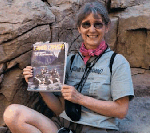 Eugenie C. Scott
Eugenie C. ScottNCSE's executive director was interviewed (full text below) in the latest issue of Science under the headline "Eugenie Scott Toils in Defense of Evolution." Introducing the interview, Science's Yudhijit Bhattacharjee wrote, "Last week, Scott won the inaugural Stephen Jay Gould Prize from the Society for the Study of Evolution, only weeks after Scientific American ranked her among the country's top 10 science and technology leaders for her self-described role as 'Darwin's golden retriever.'"
Explaining that the antievolution movement has become more diverse over the last twenty years, Scott reviewed the present situation, noting especially the prevalence of "closet creationism being introduced through wording not obvious to those unfamiliar with the history of the controversy." Asked what scientists should do to help the cause of defending the teaching of evolution, she answered, "Universities need to do a better job of teaching evolution because that's where high school teachers get their training. Evolution needs to be brought into every course of biology instead of getting tacked on as a unit to the intro class."
Newsmaker Interview:
Eugenie Scott Toils in Defense of Evolution
Yudhijit Bhattacharjee
From: Science 5 June 2009: Vol. 324. no. 5932, pp. 1250-1251
Reprinted with permission from AAAS
http://www.sciencemag.org/cgi/content/full/324/5932/1250-b
As executive director of the California-based National Center for Science Education, anthropologist Eugenie Scott has spent the past 2 decades on the frontlines of the contentious battle over teaching evolution in U.S. public schools. She doesn't confine herself to the classroom and courthouse: Every year, she and geologist Alan Gishlick lead a rafting trip through the Grand Canyon, teaching a general audience about the science and natural history of the canyon and comparing the evidence with the creationist explanation of its origins.
Last week, Scott won the inaugural Stephen Jay Gould Prize from the Society for the Study of Evolution, only weeks after Scientific American ranked her among the country's top 10 science and technology leaders for her self-described role as "Darwin's golden retriever." Scott spoke to Science last week about where things now stand.
Q: How has this battle changed in the past 20 years?
E.S.: The enemy has become more diverse. When I started, it was just creation science. Now we have creation science, intelligent design [ID], and straight-up antievolution in the form of "evidence against evolution." It used to solely be a K–12 issue. Now we are seeing that it crops up frequently in community colleges and even 4-year colleges.
Q: What's the current situation in the various states?
E.S.: Besides periodic assaults on science standards as we recently saw in Texas, we are concerned about antievolution legislation in different states under the guise of academic freedom bills. Just in the last few weeks, antievolution bills awaiting decisions in a number of states—Oklahoma, South Carolina, Alabama—died in committee. Louisiana passed antievolution legislation last year; we're now waiting to see how it plays out. We are also seeing closet creationism being introduced through wording not obvious to those unfamiliar with the history of the controversy.
Q: Why has the ID movement survived the 2005 Dover trial?
E.S.: ID proponents have repackaged ID and are promoting it as "evidence against evolution." The Discovery Institute, an ID think tank, has published Explore Evolution that quotes a "number of problems" with evolution that they would like taught in biology class. Of course, these are standard creationist arguments.
Q: Why hasn't the general public rejected ID?E.S.:
Only 40% of adult Americans understand the nature of a scientific experiment. Remember that ID is primarily a marketing strategy to the general public, and unless that is directly opposed, people are going to be miseducated about science. We don't have to worry about medical schools teaching that AIDS is a curse from God, but we have to worry about teachers teaching well.Q: Why is it important to teach evolution? Can't doctors and most life scientists do their jobs without accepting evolution?
E.S.: You can be a mechanic without understanding the niceties of the internal combustion engine. [But] wouldn't you rather go to a mechanic who has the big picture?
Q: What should scientists do to help the cause?
E.S.: Universities need to do a better job of teaching evolution because that's where high school teachers get their training. Evolution needs to be brought into every course of biology instead of getting tacked on as a unit to the intro class.
What university scientists should not do is to force students to choose between religion and science. If a professor were to say that evolution proves there is no God, that's not just bad philosophy of science, it ensures that a significant number of students will stick their fingers in their ears.
When explaining biological questions, such as the evolution of the eye, there is no need to say that God had nothing to do with it. It's an irrelevant comment. I don't think a classroom is an appropriate place to try to create more atheists any more than it is an appropriate place to create more fundamentalist Christians.
